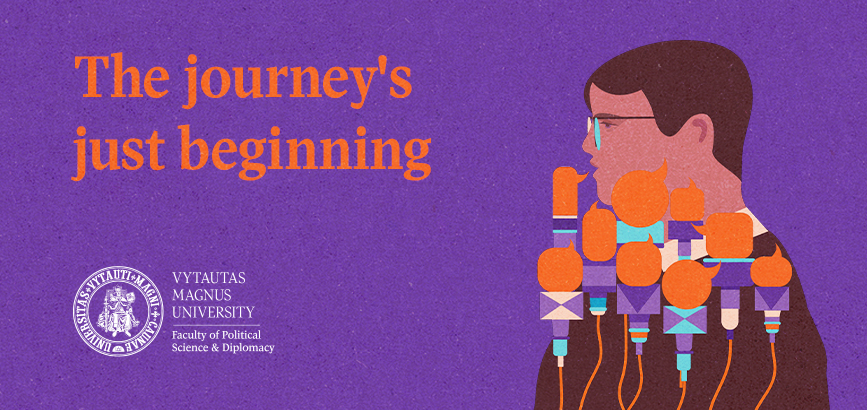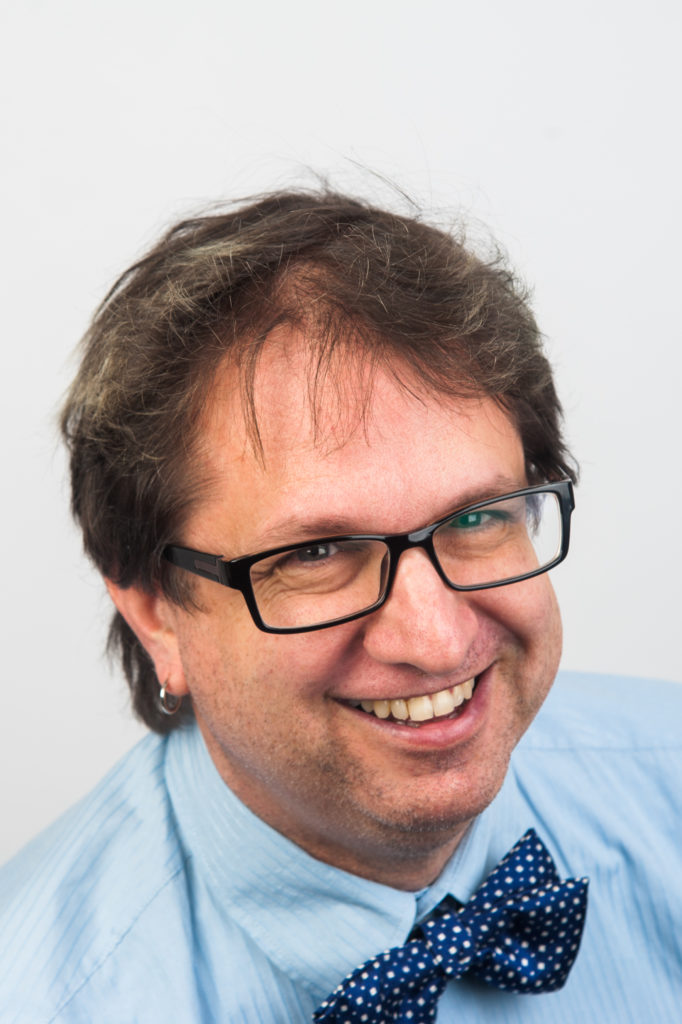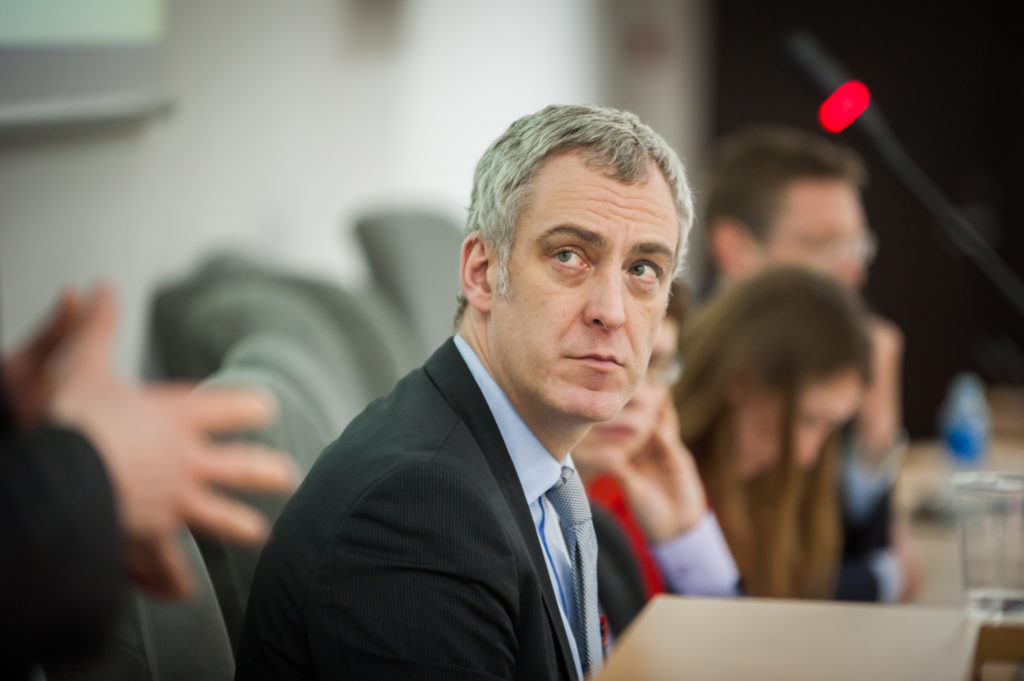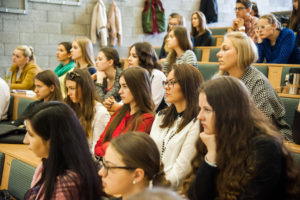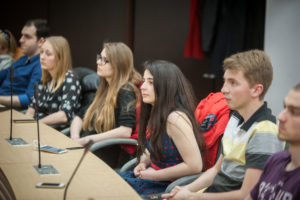Impressions from the faculty days
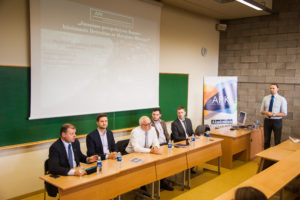 On 3-7 May Faculty of Political Science and Diplomacy (PMDF) organized Faculty days, which included many interesting events for both potential and current students. Since a great part of events was held in English, international students were also welcome to participate.
On 3-7 May Faculty of Political Science and Diplomacy (PMDF) organized Faculty days, which included many interesting events for both potential and current students. Since a great part of events was held in English, international students were also welcome to participate.
“Failure is good”
First day started with a warm welcome from Faculty’s vice dean Giedrius Česnakas to the high-school students, right before the torch was picked up by associate professor Jaq Greenspon. His friendly manner and American accent immediately allowed students to feel the international spirit of the faculty. Mr. Greenspon was talking about living dreams and achieving goals, encouraging students to leave their comfort zone as much as possible and learn from failures. According to him, failure is important, because “if you are not failing you are not trying”. The professor shared his own experience of leaving the comfort zone, which allowed him to become a writer and move from the US to Europe. He explained his choice of VMU by the opportunity to teach in English students from all over the world: “For me that was the selling point. Being at the place where all those countries will come to me is awesome. It opens me up for learning. Every semester is new. Every semester is a challenge because I do different things.”
Answering the question about his purple hair, Jaq said: “If you come and take my class on rhetoric I will give you all the tools you need to convince your parents to let you dye you hair”.
The best illustration of Jaq’s words about the countries, coming to you, were international students, who came to talk about their motivation of choosing VMU and their experience of living in Lithuania. The big international family of the PMDF was represented by students from USA, the Emirates, France, Russia, Turkey and Bulgaria.
“I wanted to track how Lithuanian people really see Russia”
On the same day visiting lecturer from University of Paris 8 Matthieu Grandpierron held two lectures on French ways to solve crisis in the developing countries and French diplomacy. He noted on the switch from the material conflict to the ideas conflict, which is much more difficult to solve. Mr. Grandpierron compared strategies, France used for its interventions in Africa, emphasizing on the importance of media support in any kind of operations. Liberating the country by force, in his opinion, is much easier than trying to assess social issues, change political system or to make all the ethnical groups within one state to live in piece, and that’s where “liberators” usually fail. French guest also answered questions about these and other hot topics, such as terrorism, French-Russian relationship, growing radicalism etc.
One of the reasons of Matthieu Grandpierron’s visit to Lithuania was his desire to see “How Lithuanian people really see Russia: as a threat or as an opportunity”.
Although his university is linked to the French Ministry of Defense, for which Matthieu has done research, he stressed, that he doesn’t necessarily have to support its official position: “Firstly, I am a researcher. I am here as a researcher, so I don’t need to bother with the official discourses”
Mock Model UN
The main event of the second day of PMDF days was a mock version of a Model UN, hosted by the United Nations Student Club. The topic of the event was War in Syria. For 2 hours Lithuanian and international students became representatives of US, Turkey, Syria, Russia, Saudi Arabia, France, Germany, Israel, Iraq and Canada.
It was a fun exercise familiarizing students with how a Model UN works and enabling them to decide if they would like to participate in a real Model UN session held on May 25-26 in VDU (https://www.facebook.com/events/1725060061074262/).
The third day
The third day had probably the busiest schedule. Two public lectures were held by the lecturer of Nicolas Copernicus University in Toruń habil. dr. Antonina Kozyrska. During the first lecture she provided the audience with the insights into the complicated religious situation in Ukraine after 1991. The lecturer also talked about the situation during Euromaidan events, noting that all the churches have common position in terms of restoring of peace, national unity and territorial integrity of the country. The second lecture was devoted to the decommunization process in Ukraine, which started from 2015 and includes removal of communist monuments and renaming of public places named after communist-related themes.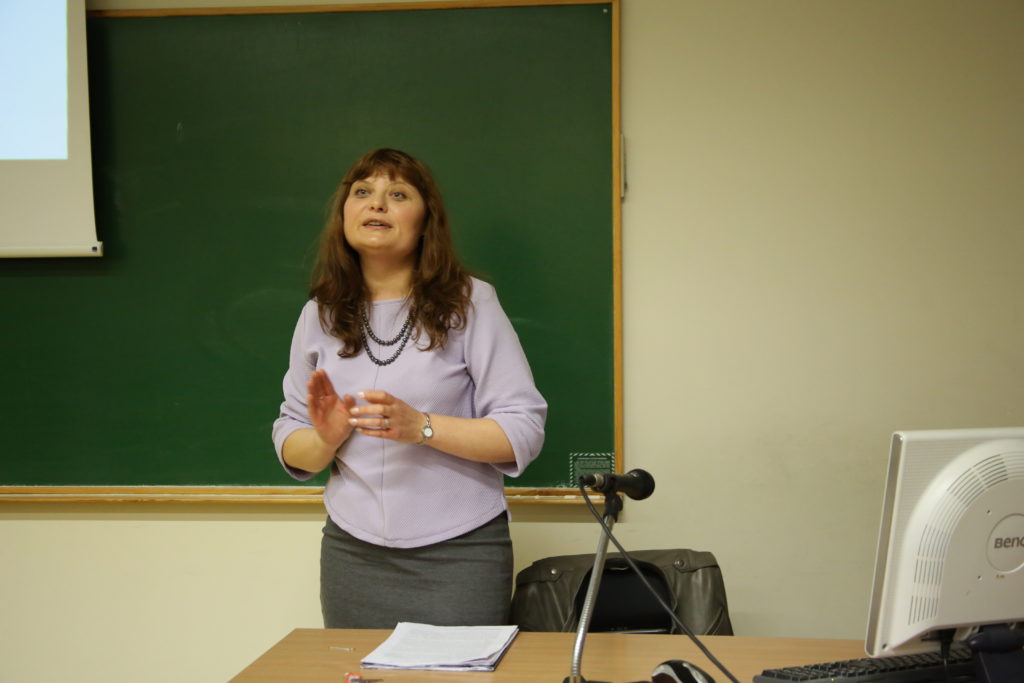
On the same day another lecturer from Nicolas Copernicus University habil. dr. Dorota Michaluk held a lecture on the historical memory of the Belarusian minority in Poland, which is mostly concentrated in Bialystok region. According to her, historical memory of Belarusians minority is different from historical memory of not only Poles but also Belarusian inhabitants of Belarus, resulting in absence of close spiritual ties with the latter.
“One page of information in your CV is better than 3-4 pages of nonsense”
The day continued with the special seminar “Career Opportunities in International Organizations”, organized by the American studies club. The Head of NATO Arms Control and Coordination Section William Alberque visited PMDF already for the second time. With a degree of humor and artistry he told students about his work experience and gave them some useful tips about how to start career in an international organization.
Thus, according to Mr. Alberque, it is important to decide what you are interested in and to attend different events, such as conferences and public speeches. He also recommended to read papers on the topics, which are interesting for you, as well as writing you own ones, which look good on CV. Another important thing, according to him, is field work and internships, which usually are more valuable than degrees. Mr. Alberque emphasized on the importance of networking, making contacts and meeting people, who could recommend you in the future, as well as exploiting national connections (people, who represent your country on the international arena) “mercilessly”. He noted that it is important to show what you can do to differentiate, to think fast and learn languages, which are a big advantage (Fluent English + Russian/Russian/Chinese/Arabic). Mr. Alberque also gave students some tips on writing resume, in particular, to make it brief (“one page of information in your CV is better than 3-4 pages of nonsense”) and base it on the description of the position, you are applying for. He also advised not to forget about social media, as applicant’s accounts are always looked through.
Besides this seminar, during PMDF days the American studies club also organized the lecture of W. Alberque “NATO’s Role in Crisis Management”, as well as Movie evening+discussion about film “Zero Dark Thirty”.
One of the organizers Gerda Jakštaitė called the events successful, emphasizing on the activity and motivation of the students, as well as the “great and cozy” atmosphere, which was the aim of organizers. According to her, the main difficulty was to get appropriate venue for the events, however, “the faculty was helpful, as always, especially administrators”.
Written by Anton Chernetskyi (student of the Faculty of Political science and Diplomacy).
G. Česnakas: I think PMDF is becoming a brand
 Vice dean Giedrius Česnakas went through all the stages of higher education at the Faculty of Political Science and Diplomacy from BA studies to PhD. He joined VMU in 2003, and since then a lot of improvements took place at the faculty.
Vice dean Giedrius Česnakas went through all the stages of higher education at the Faculty of Political Science and Diplomacy from BA studies to PhD. He joined VMU in 2003, and since then a lot of improvements took place at the faculty.
Why did you choose politics in the first place?
I was really interested in history. Maybe I was a bit naïve, which is natural for young age, but I decided, if I want to do some positive changes then I have to focus on the field which is interesting for me and get to know its strengths and weaknesses, how everything works in order to make positive impact on society. I joined because of my idealistic assumptions.
What was your favorite subject as a student?
Geopolitics and international relations.
What has changed at the faculty since you were a student?
At that time we had only one department, and now we have five of them, so the faculty has grown rapidly. Back then all the students studied only Political Science and Public Administration and after two years they could choose between those fields. In contrast, nowadays students can apply for a number of undergraduate programmes in Lithuanian or English, as well as separate programmes of Public Administration or Public Communication, so the number of programmes is growing. Now we have more lecturers. Some of them, just like me, graduated from PMDF, and after expanding their knowledge abroad, returned to teach here. There are also professors from other universities, for example, from Vilnius we have such great professors as Mindaugas Jurkynas and Egdūnas Račius. We have also lecturers from other countries. At that time we didn’t have such opportunities. The quality of education has increased significantly, the possibilities are getting better, and the students are given more attention.
PMDF is relatively young, but at the same time it’s the biggest faculty at VMU. What is the major factor for such a dramatic increase?
I think the main factor was a huge interest of students in Political Science and Public Administration, especially during the period 2000-2010, but it still remains. More than that, some new programmes were introduced, like Public Communication, which in the first years attracted enormous amount of students. 200 students applying for Public Communication was a staggering number, we didn’t expect that. Another reason was introduction of new programmes in English, which allowed us to accept students from abroad for full-time studies. In fact, we have the biggest number of students studying at VMU from abroad, comparing to other faculties. The names of well-known professors, who came to teach here, also attracted students to join the faculty.
In most of universities usually Media studies belong to Social Science faculty. Why does Journalism and Media Analysis programme belong to PMDF?
Our faculty pays much attention to interdisciplinary studies. We think that students should be able to get basic knowledge in their field, as well as expand their knowledge in other fields. Maybe this contradicts with traditions at other universities, however, we don’t see this as a weakness, but as a strength, because we have more diverse community within the faculty. When academic staff gathers, we have broader, more interesting discussions and we are able to provide new ideas and insights. I assume that it would not occur if we followed the traditional path. Next year we will launch BA programme in Philosophy and Political Critique. I assume that in contemporary world to join Philosophy and Political Science is an interesting approach. We try to suggest something new. Moreover, we try to approach new things not only in our programmes, but as well in communication with our students. We are not really hierarchical institution, so this liberal approach, when we discuss topics as equals, I think, is beneficial for both students’ education and professors’ understanding of what is interesting for the young scholars.
What other novelties can we expect in the nearest future?
We are trying to introduce new programmes in Vilnius, such as the programme for diplomats, where you can focus more on the diplomatic side of the international relations. I see vast field where we can focus on increasing quality, attracting international professors, increasing diversity of teachers. I think in the future we won’t focus on the introduction of new programmes, but maybe changing them and trying to increase their quality, satisfaction of students and maybe suggest something unexpected.
What is needed to prepare specialists, who are competitive at the labor market?
Personally, I am a bit skeptical about the idea that our faculty should prepare student for particular jobs or companies. We aren’t faculty of informatics or, let’s say, applied sciences. In those fields they can prepare student to work in particular place. In my perspective, we should do our best in using the advantage of Liberal Arts approach to give students the perspective not only in Politics or Communication or Public Administration, but also in culture, history, arts. We should focus more on creating personalities, giving possibilities, encouraging them to do more outside university, to be active citizens and participate in politics, civic society or business sector. This is a key to success in our field, in my perception.
Can you say that PMDF became an attractive brand for the employers?
I think it is becoming a brand. It takes time. We are quite young, we don’t have a lot of successful stories, but we have them. Our graduates now are quite successful politicians, some of them were advisors to the prime minister, some work in different ministries and municipalities. The number of students is active in private sector. Some work at NATO, in EU institutions and think tanks, media and public communication organizations, so I think, we are on the good path.
Do events like conflict between Ukraine and Russia, refugee crisis affect study programmes in the field of politics?
I like to work in this field, because each time when you go to the lecture, you have to take time to prepare for it. It isn’t like in Math or Physics, when you know general rules and they don’t significantly change with the time. However, when you teach foreign policy or international relations, each time you have to read, to update your information, to add or exclude something. It takes a lot of time actually, compared to some other fields, but, I think, we need to be dynamic to provide the newest insights, to explain the world, because we don’t have any general laws about how politics or international relations work. We have ideas, assumptions how they work, and they are tested every day, and we must be able to catch up to the latest news. That’s why every evening after work I watch and read about what happened in the world.
What sources do you trust?
Personally I watch CNN, BBC, Lithuanian news network. After that I just find some middle ground, let’s say, because I perfectly understand that media cannot be neutral. I also read different publications by think tanks, which provide information from reflective perspectives. I compare information from different kind of sources with different ideologies and then I can construct my own thinking, and suggest it to students.
If you had a possibility to invite any professionals/opinion leaders to hold a lecture at PMDF, who would they be?
I would like to invite Christiane Amanpour from CNN, Zbigniew Brzezinski or Henry Kissinger. It would be interesting to invite Angela Merkel, because she shows strength to make decisions, she is not afraid not to succeed. I’d like also to have discussion with Bill Clinton, Stephen Walt, John McCain.
Interview was taken by Anton Chernetskyi (student of the Faculty of Political science and Diplomacy).
Conference about Lithuanian and Polish relations
 Adomas Mickevicius Club of Polish Language and the Department of Political Science of Vytautas Magnus University with partners are organizing the 3rd International Scientific Conference “Dynamics of Lithuanian-Polish relations”, which will be held on 15-16thof September, 2016. The conference is dedicated to commemorate the 25thanniversary of restoration of the diplomatic relations between Lithuania and Poland. The conference examines the interdisciplinary dynamics of Polish-Lithuanian relations. The conference offers the open discussion in the field of Social sciences and humanities research.
Adomas Mickevicius Club of Polish Language and the Department of Political Science of Vytautas Magnus University with partners are organizing the 3rd International Scientific Conference “Dynamics of Lithuanian-Polish relations”, which will be held on 15-16thof September, 2016. The conference is dedicated to commemorate the 25thanniversary of restoration of the diplomatic relations between Lithuania and Poland. The conference examines the interdisciplinary dynamics of Polish-Lithuanian relations. The conference offers the open discussion in the field of Social sciences and humanities research.
The aim of the conference― to focus on research on cooperation between Lithuania and Poland, including the problems of security and identity, the common historical and cultural heritage, the issues of minorities in Lithuania and Poland, political, economic, and social conditions in these countries, the coinciding political, security, foreign policy interests in the European Union, the Baltic Sea region, and other regional organizations.
Topics addressed should include:
- Political, social, economic, culturalrelations between Lithuania and Poland;
- Cooperation betweenLithuania and Poland in the field of security;
- Cooperation betweenLithuania and Poland in the regional structures (EU, NATO, the Baltic Sea region);
- Ethnic identity and its development: the problems of Lithuanian and Polish identity.
Conference language –English.
Contact person: Mindaugas Norkevičius ( email: mindaugas.norkevicius@vdu.lt)
The Head of NATO Arms Control and Coordination Section will be visiting the Faculty
 The Head of NATO Arms Control and Coordination Section William Alberque is going to visit Faculty of Political Science and Diplomacy on the 5th of May, 2016. William Alberque is going to take part in the conference “Contemporary political processes: challenges and possibilities” and giving public lectures as well as interacting with students.
The Head of NATO Arms Control and Coordination Section William Alberque is going to visit Faculty of Political Science and Diplomacy on the 5th of May, 2016. William Alberque is going to take part in the conference “Contemporary political processes: challenges and possibilities” and giving public lectures as well as interacting with students.
William Alberque is an expert on arms control, international relations, and national security who has extensive knowledge and experience in the field of strategic planning and strategic communication. Before becoming the head of NATO Arms Control and Coordination Section, mr. Alberque was the director of European Security in the United States Department of Defence and the U.S. Department of State as an expert on disarmament.
| Time | Place | Event |
| 5 May 9.00 AM | VMU’s Small hall (S. Daukanto g. 28) | „NATO Adaptation on the Road to Warsaw” in the conference “Contemporary political processes: challenges and possibilities” |
| 5 May 4.00 PM | VMU’s Small hall (S. Daukanto g. 28) | Lecture “NATO‘s Role in Crisis Management” |
| 5 May 2.00 PM | VMU Vero Cafe (S. Daukanto g. 28) |
Special seminar “Career Opportunities in International Organizations” Students must register in advance. More Information is available on the “American Studies Club” Facebook page |
The events are held and lectures are given in English. The events are a part of “PMDF days”. The event are organised by the “American Studies Club”.
More Information and inquiries: Gerda Jakštaitė. Email: gerda.jakstaite@vdu.lt
Kaunas International model of United Nations
 Come join as at Vytautas Magnus University on May 25th and 26th to participate in the first ever Kaunas International Model UN! The event will take place throughout the entire day of the 25th and 26th – involving numerous activities. If you are interested in participating and representing a country, you MUST REGISTER for the event. The topic of this year’s Model UN is: The Syrian Refugee Crisis.
Come join as at Vytautas Magnus University on May 25th and 26th to participate in the first ever Kaunas International Model UN! The event will take place throughout the entire day of the 25th and 26th – involving numerous activities. If you are interested in participating and representing a country, you MUST REGISTER for the event. The topic of this year’s Model UN is: The Syrian Refugee Crisis.
The countries to be represented include (but are not limited to): Syria, Turkey, Greece, Italy, Jordan, Lebanon, Egypt, Hungary, France, Germany, UK, Libya, Iraq, Canada, Sweden, USA, Saudi Arabia, Russia, China. If the above countries are filled, participants will be more than welcome to represent additional countries. Don’t forget that you can pair up and have more than one person in a delegation!
This event is organized and hosted by Vytautas Magnus University’s United Nations Student Club with the help of ESN Lithuania.
What is Model United Nations?
Model United Nations is a simulation of the different organs of the United Nations in which the delegates represent a country in order to debate about issues of international relevance. During the sessions, the delegates have to debate about the topics that have been proposed by their committees and prepare a working paper with the aim at creating draft resolutions, which will include measures agreed concerning the problem that has been debated. The sessions are ruled by a Chair and a Co-chair, who are in charge of moderating the debates.
Why participate in a model of United Nations?
It is the best way to see how the real United Nations Assembly or its different bodies work and how the process of trying to find applicable solutions to international problems works. In a MUN you acquire a lot of knowledge, but also develop different skill sets such as leadership, public speaking, and negotiation.
As meeting new people and creating friendships is also important in the international community, delegates will have the opportunity to join different social activities, which will make the MUN more fun.
Human rights Council
TOPIC: Syrian refugees. Human rights of people displaced due to conflict zones.
The Human Rights Council (UNHRC) is an inter-governmental body within the United Nations system responsible for strengthening the promotion and protection of human rights around the globe and for addressing situations of human rights violations and offering resolutions to them. It has the ability to discuss all thematic human rights issues and situations that require its attention throughout the year. It meets at the UN Office in Geneva.
Secretary General’s message
Dear Delegates, Chairs, Staff Members, and friends of KIMUN,
On behalf of our dedicated Secretariat General, it is my utmost pleasure and honor to invite you to the first edition of KIMUN. This event is organized by students, for students. These students spend time and effort on a daily basis to develop projects that enrich their university experience and the experience of others.
With support from members of the Erasmus Student Network (ESN) in Lithuania and Vytautas Magnus University faculty, the first edition of KIMUN will be held from the 25th-26th of May in VDU Mažoji sale.
We are very excited to be kicking off with the first edition of Kaunas International Model UN and hope that by hosting this event we will be enabling the creation of lifelong friendships between students interested in diplomacy. Our aim in holding this event is to make students open their minds and experience something different – giving them a taste of how international relations works outside the classroom.
MUN’s are one of the most enriching experiences for international relations and political science students to participate in. A lot of the current world leaders were once “Model UNers.” In fact, UN Secretary General Ban Ki-Moon has participated in them. MUNS are a fun way to learn about current world affairs. Being globally aware is of utmost important in this fast-paced era. MUNs are also great for developing leadership skills, improving public speaking, and teamwork. And for some, this may provide an opportunity for perfecting a second language. Not to mention all the people with shared interests you will meet!
The Secretariat is already working hard to create Kaunas’ first official Model UN and hopes that it will attract students from many different countries and backgrounds. As a part of KIMUN, you will not only tackle one of the most challenging problems of our time, but you will also discover your ability to become a powerful negotiator – a power that rests on your understanding of opposing views. This skill will not only help you make the world a better place, it will help you in your daily life. I encourage you to think outside the box and, by doing so, to challenge yourself to offer new solutions to resolving an issue.
Outside the committee, delegates can look forward to two wonderful events. For more information on the committee, special events, and other conference details, look through www.unstudentclub.org or visit our Facebook event at https://www.facebook.com/events/1725060061074262/.
We look forward to welcoming you in May 2016!
MEET THE TEAM!
SECRETARIAT GENERAL
SECRETARY GENERAL – Olivia Wells
Olivia majors in international relations and development studies at Vytautas Magnus University in Kaunas, Lithuania. Born and raised in New York, Olivia has lived and studied all over the world including Denmark, Venezuela, Greece, and Israel. During her time in Greece, she worked with the Hellenic Foundation for European and Foreign Policy, where she spearheaded several projects concerning development in the Balkan states. She currently works with the international human rights organization PACT in Lithuania, where she is involved in projects concerning democracy implementation and civil society engagement in Belarus. Last summer Olivia worked with WITNESS in New York – a human rights NGO that trains people in how to use film to document human rights violations and protect their civil liberties. And this summer Olivia will have the opportunity to work with the Human Rights Foundation, particularly on organizing the Oslo Freedom Forum. Olivia is also the president of the United Nations Student Club at VMU and is excited to be implementing VMU’s second Model UN in the past two years. As VDU’s first official Model UN, she thinks this year’s sessions will be the best to date!
CHAIR – Alba Maria
Alba María is from Spain and is currently studying international relations at Vytautas Magnus University in Kaunas via an Erasmus exchange program. She is particularly interested in human rights and member of several different associations dealing with human rights work. She has participated in five Model UNs and is very excited about organizing this one. She believes Model United Nations helps participants to develop many different skills for both personal and professional development and is an excellent opportunity to meet so many people interested in international affairs. She will be one of the chairs of this year’s Human Rights Committee. She is looking forward to this Model UN happening!
CO-CHAIR –Konrad Eduardo
Konrad Eduardo is a bachelor’s student of International Politics and Development at Vytautas Magnus University (VMU). He studied at the Interdisciplinary Center of Herzliya in Israel and will complete his master’s at the University of St. Andrews in Scotland in terrorism and political violence. He has won best delegate in the Caracas Model UN and the Simon Bolivar University Model UN in 2009. He has represented Venezuela in the Ivy League Model UN in Philadelphia in 2010, and has presided over committees in The Instituto Cumbres de Caracas Model UN in 2010 and 2011. Last year he co-chaired VMU’s first model UN and he is excited to do so again this year in the Kaunas International Model UN.
COMMUNICATIONS MANAGER – Gertruda Cepulyte
Gertrūda Čepulytė is the communications manager at the United Nations Student Club (UNSC) at Vytautas Magnus University in Kaunas, Lithuania where she studied international relations and development studies. She has been a member of the club since November 2014 and is also a co-founder of the organization. Back in May 2015, Gertrūda participated in the UNSC’s first Model UN representing the Ukrainian delegation. She is excited about organizing the upcoming Kaunas International Model UN on the 25th of May, as she anticipates that it will once again be an enriching experience.
PROJECTS MANAGER – Ieva Steponaviciute
Ieva is the newest member of the United Nations Student Club and this is her first time participating in and organizing a Model UN. She is currently completing her bachelor’s degree in Lithuania at Vytautas Magnus University (VMU) in the faculty of Political Science and Diplomacy. She is also completing a duel bachelor’s degree in performing arts (operatic singing) at the Music Academy at VMU. Ieva was born and raised in Vilnius, Lithuania and graduated from one of the top secondary schools there. During her high school years she was a member of the Students Parliament and is experienced in organizing events. She looks forward to participating in KIMUN!
PROJECTS MANAGER – Gintaras Aniulis
Gintaras Aniulis is a second-year international politics and development studies student at Vytautas Magnus University who was born and raised in Kaunas, Lithuania. His interest in the political world began when his parents took him with them to medical and technological conventions based in most of the world’s greatest cities and landmarks. Having experienced firsthand different cultures in different parts of the world, he was inspired to seek a political career to further develop his knowledge. Helping host a Model UN in his first year of university, as well as a TEDx half a year later, he hopes that other students will be able to obtain the same opportunities to develop their academic abilities for their future careers as well as their personal lives. He is very excited to build off the knowledge he acquired from last year’s Model UN where he represented the delegation from Germany.
MARKETING MANAGER – Sandra Matoskaite
Sandra Matoskaite is currently studying international politics and development studies at Vytautas Magnus University (VMU) in Kaunas, Lithuania. She is a member of the council and projects manager at the United Nations Student Club (UNSC) at VMU. She is also a volunteer at the European Youth Forum and one of the staff members of the European Youth Event of 2016. In the first Model UN of UNSC she represented the Libyan delegation. Sandra is super excited to be one of the team members that are organizing the KIMUN!
Lecture about multiculturalism in Azerbaijan
May 5, 14:15, a public lecture by assoc. prof. Afsana Mammadova (Azerbaijan National Academy of Sciences) will be held at the Faculty of Political Science and Diplomacy (Gedimino g. 44-301) entitled “Multiculturalism of Azerbaijan”.
Assoc. prof. Afsana Mammadova aworks in Azerbaijan National Academy of Sciences. Baku International Multiculturalism Center initiated series of lectures about multiculturalism in Azerbaijan. Lecturer will present how despite different historical circumstances and political traditions, various cultures and religions coexist in the state.
Lecture will be held in English.
Lecture about historical memory
 5 May 2016, a public lecture by the lecturer of Nicolas Copernicus University in Toruń habil. dr. Dorota Michaluk will be held at the Faculty of Political Science and Diplomacy (S. Daukanto g. 28-105) entitled „Historical memory of the Belarusian minority in Poland“.
5 May 2016, a public lecture by the lecturer of Nicolas Copernicus University in Toruń habil. dr. Dorota Michaluk will be held at the Faculty of Political Science and Diplomacy (S. Daukanto g. 28-105) entitled „Historical memory of the Belarusian minority in Poland“.
Habil. dr. Dorota Michaluk – historian, graduate of the University of Warsaw, assistant professor at the Department of Eastern Europe of Nicolas Copernicus University in Toruń. Researcher is interested in the field of East European history. She specializes in the history of Belarus and Grand Duchy of Lithuania and the national movements in Eastern Europe. Habil. dr. D. Michaluk wrote several books on the history of Podlasie region and in 2011 published a monograph „Belarusian People’s Republic 1918-1920. The genesis of Belarusian Statehood“.
Lecture will be held in English.
Lectures about political situation in Ukraine
 5 May 2016, public lectures by the lecturer of Nicolas Copernicus University in Toruń habil. dr. Antonina Kozyrska will be held at the Faculty of Political Science and Diplomacy about Ukraine’s political situation.
5 May 2016, public lectures by the lecturer of Nicolas Copernicus University in Toruń habil. dr. Antonina Kozyrska will be held at the Faculty of Political Science and Diplomacy about Ukraine’s political situation.
Habil. dr. Antonina Kozyrska – graduate of The John Paul II Catholic University of Lublin, assistant professor at the Department of Eastern Europe of Nicolas Copernicus University in Toruń. Researcher is interested in social issues of Eastern Europe. She specializes in cultural, religious and national processes and the changes of identities in the region, primarily in Ukraine. In 2014 published a monograph „Religious Pluralism and the Integration of the Ukrainian Nation After 1991″ (Toruń 2014).
| Date | Place | Title |
|---|---|---|
| May 5, 11:15 | Gedimino g. 44 – 202 | “The religious situation in Ukraine after 1991″ |
| May 5, 14:45 | S. Daukanto g. 28-105 | “The decommunization process in Ukraine after Euromaidan” |
Lectures will be held in English.
Public lecture about French diplomacy
![12310501_993987457328718_3717456583349753247_n[1]](https://pmdf.vdu.lt/wp-content/uploads/2016/04/12310501_993987457328718_3717456583349753247_n1-233x300.jpg) On 3rd May public lectures by Matthieu Grandpierron will be held at the Faculty of Political Science and Diplomacy. Lecturer will present French diplomacy and the ways how France solve crisis in international arena.
On 3rd May public lectures by Matthieu Grandpierron will be held at the Faculty of Political Science and Diplomacy. Lecturer will present French diplomacy and the ways how France solve crisis in international arena.
| Date | Place | Lectures |
|---|---|---|
| 3 May, 13:15 | Gedimino g. 44 – 203 | “Is there a French way to solve crisis in developing countries?” |
| 3 May, 16:15 | Gedimino g. 44 – 202 | “Protecting and developing interests. French diplomacy between change and continuity” |
Lectures will be held in English.
R. van Voren – Dutch referendum a painful mistake
 Whatever the outcome of the Dutch referendum on the EU-Ukraine Association Agreement will be, the whole process has been very much enlightening and disheartening at the same time. The Dutch state spent forty million euro on a referendum that asked citizens to vote for or against an agreement virtually nobody read, very few really understood, concerning a country most people didn’t know anything about and where virtually none of the voters have ever been. In other words: whatever the people decided, it was a decision based on a total lack of what was at stake and with an avalanche of information that was often incomplete, tendentious or consisting of outright lies. In that respect, the referendum that was meant to be a highly democratic tool turned into a farce and an insult to democracy.
Whatever the outcome of the Dutch referendum on the EU-Ukraine Association Agreement will be, the whole process has been very much enlightening and disheartening at the same time. The Dutch state spent forty million euro on a referendum that asked citizens to vote for or against an agreement virtually nobody read, very few really understood, concerning a country most people didn’t know anything about and where virtually none of the voters have ever been. In other words: whatever the people decided, it was a decision based on a total lack of what was at stake and with an avalanche of information that was often incomplete, tendentious or consisting of outright lies. In that respect, the referendum that was meant to be a highly democratic tool turned into a farce and an insult to democracy.
Of course, it all started on a wrong footing. The campaign to hold the referendum was organized by people who later acknowledged they didn’t care less about Ukraine but were only interested in destabilizing the European Union. Their ultimate goal was the departure of The Netherlands from the EU and for that Ukraine had to be sacrificed. The fact that the campaign was organized with a EU subsidy that should have not been used for this purpose was illustrative of the organizers’ nihilism, and later they managed through other tricks to accumulate four times the maximum campaign subsidy they were allowed to receive from the Dutch government.
This governmental subsidy was a farce it itself, because the committee that dispersed the funds had no interest in content but only looked at technicalities. The result was that a businessman managed to get 50,000 euro to print toilet paper with “information” against the agreement, which was again a concoction of half-truths, outright lies and a lot of information “from hearsay”, all focused on making people vote against. The organizers of the referendum again played a clever trick by claiming they campaigned “against’, “in favor” and “neutral”, thus amassing more funds by applying for subsidies for all three campaigns separately. That the “neutral” and ‘in favor” campaign materials were so cleverly written that they too evoked an “against” feeling was apparently not of importance.
Socialist Party MP and campaigner Harry van Bommel, who in spring 2014 stood on Maidan after the carnage and voiced his support for those who fought for freedom, now took a totally different party line. He campaigned “No, no, no” (as if one “no” is not fully understood) and to support his view he paraded a number of “patriotic Ukrainians” who helped explain to the Dutch voters that Ukraine was a divided country in civil war and that many Ukrainians were against this agreement. First there was a self-professed former neighbor of Yanukovich now living in The Netherlands. Then at party gatherings he decided to use the highly-criticized French propaganda film “Masks of the Revolution”, to show that Ukraine is run by a gang of corrupt, right-wing semi-fascist crooks. Subsequently he aired a clip by the separatist Aleksei Zhuravko, a former MP of the Party of Regions who is now hiding from the SBU because of collecting financial support for the separatists and who continues to this very day to post photos of Ukrainian troop movements in social media in order to inform the enemy of their whereabouts and strength. Anything to feed his “no” campaign, irrespective of the content.
And thus the level of the debate continued to sink. Dutch media tried to remain “neutral”, balancing views from both sides. But this not only concerned views in The Netherlands, also Ukrainian views “against” should be put on an equal level as views “in favor”. A Dutch journalist complained to me that she had been sent to Kyiv to interview a Ukrainian “in favor”, “neutral” and “against”. But where to find an “against” here, she sighed. So she went to the DNR, sure she would find one over there. That three-quarters of the Ukrainians are in favor of this Association Agreement was carried by only few media.
This latter problem – the overwhelming urge to be “neutral” – is hard to explain. The notion that “the truth is in the middle” has taken on such huge proportions that taking sides and supporting a cause have almost become “unhealthy”. One factor that plays a role, I think, is the fact that many experts of the region are either Russia based, or have families in Russia, or are Russia-oriented, and so often they look at the Russo-Ukrainian war with “Russian eyes” or at least under strong influence of Russian media and public opinion. What they don’t understand is that Putin’s Russia is not Russia, but a country gang-raped by 75 years of communism and subsequently hijacked by one of the worst rapists, the KGB. So while dissident Russian writer Vladimir Voinovich makes his choice and openly states he will not visit Crimea as long as it is occupied even though his parents are buried there, they continue to be “neutral” and support the Moscow-induced view that there is a civil war in Ukraine and that the country is run by a corrupt clique that romances with right-extremism. Their views have an impact, because they are “experts” and thus they should know. And in the sea of total ignorance their well- worded opinions are swallowed almost without criticism.
The campaign for the referendum has triggered the worst possible discussions and debates in social media. Naively, I always thought that the Dutch after 400 years of democracy had at least a certain minimal standard. That view has been totally crushed. What I saw passing by was worse than I could have imagined in my worst dreams. It was much worse than the shouts of the mob in Vilnius in 2011 during the gay parade in the city, which I then ascribed to being in a post-totalitarian country still learning the ropes of democracy. Well, in Lithuania the climate has changed, and much for the better. There they know what lack of freedom means, they understand the necessity of defending it, at all costs.
In Holland it seems the past is long forgotten and the cosy life in an affluent country has made people greedy, self-serving, egocentric and above all fundamentally dissatisfied. They are convinced they are entitled to have only the best and that the whole world is crouching upon them in order to take away that what is “rightfully theirs”: Muslims, Poles, corrupt politicians, and now another 45 million Ukrainians. They repeat slogans about “right wing extremists” and “fascists” in Ukraine, without realizing that their populist leaders are faithful pupils of Mussolini and the like, and that their “popular resistance” has the same elements as politics in Germany in the late 1930s.
To me the referendum has been a very painful confrontation with the country in which I grew up. It was a liberal country, a country with free people, open-hearted, welcoming and with a very vibrant community of people working in charities and aid organizations, either as volunteer or as a professional calling. The Netherlands I saw these past weeks are a total opposite. I am ashamed of the Dutch who voted against Ukraine, who do not understand the price of freedom, who do not understand the psychological importance of knowing there are others by your side. It goes too far to say the country needs a little war to wake up, but deep down I cannot resist that nasty feeling. 70 years of peace have turned a nation into a wobbling overfed Christmas turkey. Poor country, and poor Ukraine that sees its integration into the European family threatened by this self-indulging lot.




